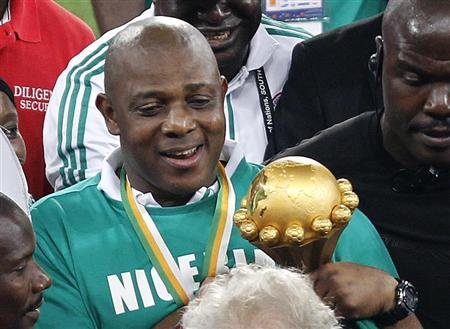 I remember the passing of Mudashiru Lawal, former Nigerian international, ex-captain of then IICC Shooting Stars of Ibadan Nigeria; in 1991. It was also very sudden, unexpected and painful.
And I think that was the last time any footballer’s death affected me as much as Stephen Keshi’s has done in the last 48 hours. I have woken up always hoping it was all a dream and that he is still alive.
I remember the passing of Mudashiru Lawal, former Nigerian international, ex-captain of then IICC Shooting Stars of Ibadan Nigeria; in 1991. It was also very sudden, unexpected and painful.
And I think that was the last time any footballer’s death affected me as much as Stephen Keshi’s has done in the last 48 hours. I have woken up always hoping it was all a dream and that he is still alive.
But I open pages of newspapers, internet pages, social media and even my own email boxes, and see condolence messages, reactions and tributes and it will always dawn on me that Keshi was indeed gone – and it still hurts.
But amid all that hurt is a certain feeling of joy – joy that Stephen Keshi did not die a pauper, or a demeaning or undignified death. And the tributes that flowed? Coming from all corners of the world; young and old, male and female, football people, non-football people – I think it epitomized the guy and what he was – arguably the most successful black African coach, and a very well-liked person.
And I am proud to be one of those who could say “I knew him, and knew him very well”.
Did we have issues? No. Did we agree at all times? No. But did I acknowledge him for who he was and what he achieved? Very much so. And that is all that matters at this time.
Since his death only 2 days ago, a lot has been said about how to remember Stephen Keshi. How should Nigeria remember him? How can the NFF immortalize him and make him some figure that Nigeria will never forget?
Name a street after him? Name a stadium after him? Build a momentous edifice in his honour? Prizes? Awards? The list is endless. And all these will be welcome in a big way.
But I have an idea, going by the background I am about to give.
Stephen Keshi gave new meaning to the word ‘expatriate’ in coaching. When he finished playing the game and tried his hands as assistant coach to Amodu Shuaibu for Nigeria in 2001/2002 (winning the ticket for Nigeria to play at the 2002 FIFA World Cup in the process), he decided to branch out.
African nations have a habit of going to Europe and South America in search of national coaches. But from 2003 onwards, any vacant African national team job that was going, Keshi will put his name forward. He will pitch himself against the seemingly ‘big names’ from Europe and expect that he be chosen. A bit like his predecessor (also the last captain to win the Africa Cup of Nations before his group did – Christian Chukwu in 1980) who also tried out as coach of Kenya before him.
But Keshi was bullish. He believed he was as good as the big ones from Europe – if not better. And he fought for recognition; and landed the job as national coach of Togo, apparently beating many French coaches to the job.
He was there again in Mali, doing the same thing a few years later, beating a host of foreign candidates to the job.
Then he got the Nigeria job and I really got to see how much self-belief he had, in himself, and in his lot – Nigerian, or shall I say, African coaches.
I personally recall how Keshi stood firm against the appointment of a European as Nigerian Technical Director, strong in his opinion that a ‘foreigner can not know my country better than someone from here’. I recall how, leading up to a crucial game against Malawi, Keshi described his counterpart – a Belgian – as ‘a white dude. He’s not African, he should go back to his country’.
Today is not about passing judgement on the merits of Keshi’s utterances. Rather it is to show the man that he was – one who believed in Africa and believed that Africans should be allowed to do African jobs.
And I would say we all can immortalize Keshi, by instilling self-belief in ourselves.
I think the biggest and strongest legacy that the Nigeria Football Federation (of which I am a part) can derive from the life of Keshi is to jettison all talk of hiring a foreign expatriate for the Nigerian national team – and to empower and enhance the capacity of the guys in charge to bring them to a level that Keshi would like to see them. It will be to enrich the knowledge and experience of someone like Salisu Yussuf that he can coach Nigeria, take them through qualification for the World Cup and improve the lot of Nigerian coaches.
In the wider world, we should all take a leaf from Keshi’s book, and find a way to develop more coaches in Africa; educating and training them to a point where they will be worthy applicants and potential employees for any national team – versed in the rudiments and the sciences of the game – such that they will stand shoulder-to-shoulder with the so-called expatriates from abroad.
The day we see coaches from various countries in Africa applying across the continent for jobs, having the right qualifications and getting the chance to be considered and subsequently employed; will be the day that we are doing true justice to the Stephen Keshi Legacy.
